8 Farmers Weekly Awards finalists give their diversification tips
Farmers Weekly asked some of its diversification award finalists from the past few years for their tips and experience of planning and running a new and different enterprise.
Managing many more staff than usual has been a challenge for many but they can offer solutions based on their experiences.
Simon and Jackie McCreery, Yester Farm Dairies, East Lothian
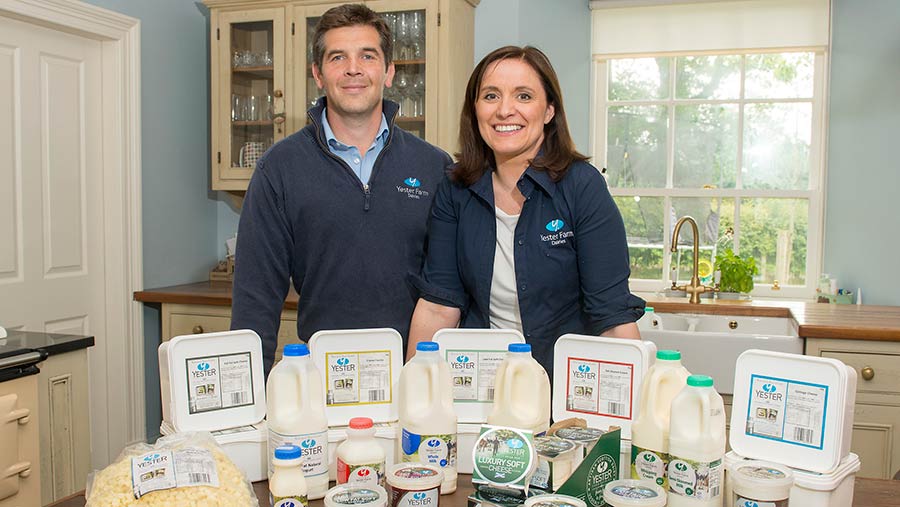
Jackie and Simon McCreery. © Angus Findlay
Simon and Jackie have produced milk, cream, and cultured creams from the family farm since 2003. In 2015 they added soft cheeses to the range, which are produced in a cheese room created in a converted grain barn.
See also: Insurance tips for new farm enterprises and diversifications
The products – including cottage cheese, soft cheeses, mozzarella, crème fraîche, set soured cream and natural yoghurt – are sold to 30 wholesalers and major retailers.
Farm facts
- Dairy and arable enterprise
- Herd of 400 Holstein-Friesians
- Flying-herd model and three-times-a-day milking
- 10,700 litres a cow a year at 3.9% butterfat and 3.34% protein
- Supplying to food service and retailers
- 32 employees, all permanent
- 162ha owned, 61ha rented
Tips
- Diversify into something you are passionate about and will enjoy doing
- Talk to people who have done it before
- Trust your instincts on staff. Do everything you can (within your resources) to develop and motivate the good ones so that you keep them.
Biggest challenge
Recruiting and retaining the right people.
Solution
We have learnt that you need to nip staff problems in the bud so that you don’t waste time and money and affect the morale of others by retaining a person with the wrong skill-set in a role.
It might be expensive to start again and retrain a new person, but in the long run you will be better off. We definitely still don’t get it right all the time but we have built a good team around us now.
The Nicholson family, Cannon Hall Farm, South Yorkshire
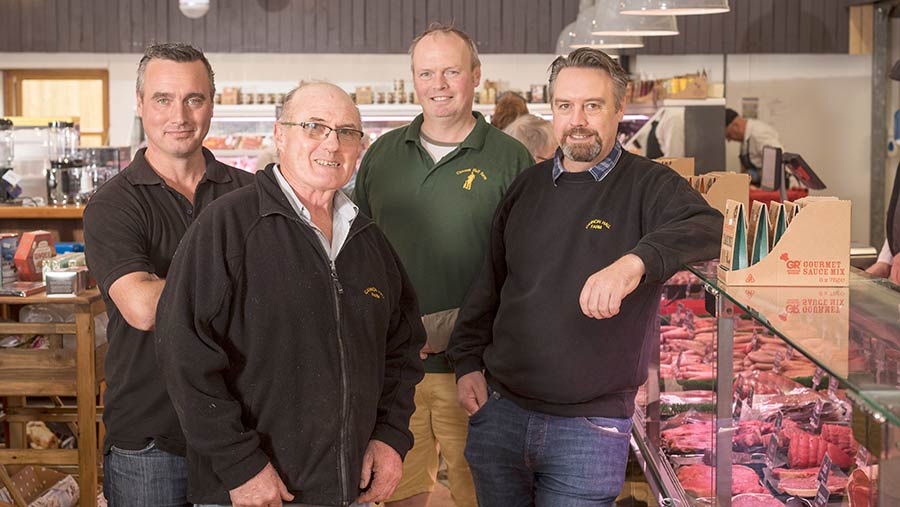
David, Roger, Rob and Richard Nicholson. © Jim Varney
The Nicholson family have created one of the UK’s biggest working farm attractions. Cannon Hall Farm opened to the public in 1989 and now welcomes 500,000 visitors each year while attracting almost 2.5m Facebook page views.
Staffed by a team of 250, the farm offers an insight into agriculture along with play areas and fine-dining restaurants serving home-grown produce. The farm has also launched a veg box scheme.
Farm facts
- Farm attraction with livestock viewing galleries
- Two 300-seat restaurants, indoor and outdoor play areas, farm shop and butchery
- Produce 800 lambs, 1,000 piglets and finish 300 cattle a year
- Meat sold through the business
- 200 staff
Tips
- Make sure there is a market for the product or service you want to introduce, at the price you need to charge before investing in creating it.
- Try to work to your strengths and recognise your weaknesses. Delegate the jobs that don’t suit you.
- Don’t forget marketing and, if possible, do it yourself. Sell your story. No one knows your business better than you.
Biggest challenge
Growing fast had its headaches and the biggest challenge has been managing more than 250 staff.
Solution
We’ve now got a fully qualified family member to head our HR department and that has made a big difference.
The Richards family, The Green Waste Company, Cornwall
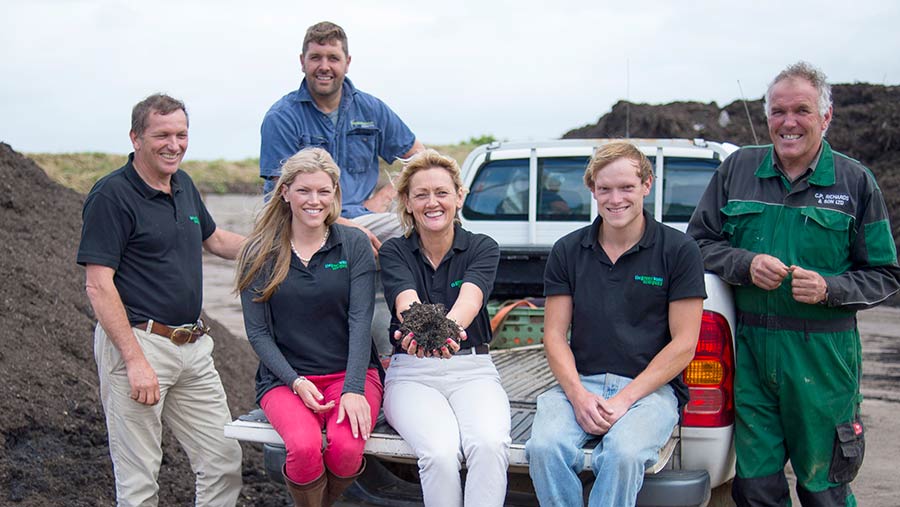
The Richards Family. © Jim Wileman
Low milk and vegetable prices during the 1990s spurred the family to establish a waste disposal business at the 445ha mixed-farm. The company composts 35,000t of green waste a year across two yards, with eight employees, including family members.
The compost is certified to the British Standard PAS 100 mark and is sold to 40 local farmers, the Eden Project and the everyday gardener.
Farm facts
- 445ha owned and rented
- 330 dairy cows and followers
- Grows crisping potatoes, cauliflowers, asparagus and forage crops
- Green waste contract indirectly with two councils
- Processes 35,000t of green waste annually across two sites
- Sells compost to 40 farmers
- Employs eight people and supports three families
Tips
- Research everything you possibly can about the business you want to establish and talk to as many qualified people as possible in the process. With that knowledge then have faith in what you are doing.
- Keep going, even if there are setbacks.
Biggest challenge
Learning a different skill set and trying to do a lot of extra jobs in unfamiliar areas.
Solution
Keeping going, fuelled by the trust that our market research was robust.
James Hewetson-Brown, Wildflower Turf, Hampshire
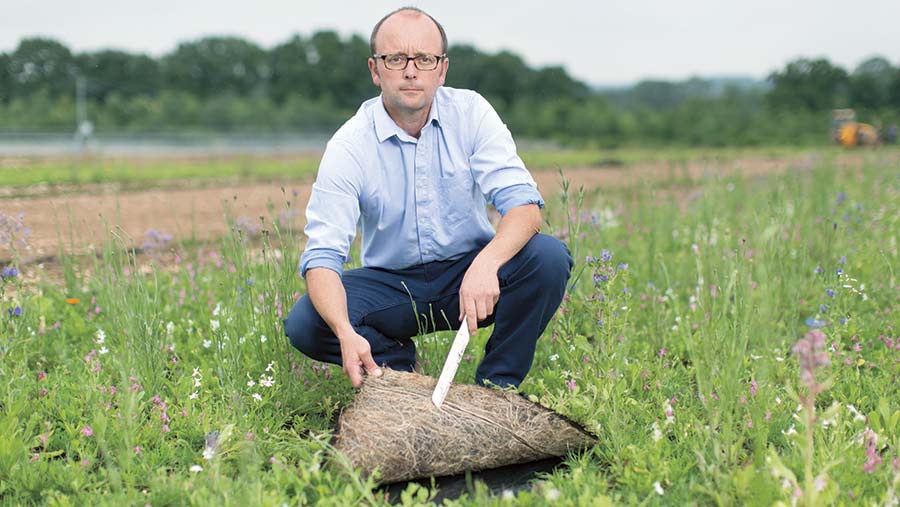
James Hewetson-Brown. © Tim Scrivener
The arable farm has grown lawn turf on green compost and netting since 1983. The netting allows the turf to be lifted and James introduced the first wildflower seed mix on 600 sq m in 2003.
Production has doubled every year since, with approximately 90% of the customer base being trade. High-profile customers include the London Olympics and film-making companies.
Farm facts
- 283ha arable farm
- Growing grass seeds, wheat and spring barley
- Team of 12 across farm and diversification business
- Wildflower turf growing began in 2003
Tips
- Don’t overcomplicate plans, but take a structured approach to setting up your business using all the advice available from a range of different people.
- Plan to succeed. When investing, don’t compromise by buying smaller machines or cheaper software packages than you need. It will limit your chance of reaching your goals.
- Don’t leave labour recruitment until you are already too busy. Think ahead about who you need and employ them straight away if you see the right person.
Biggest challenge
Recruiting farming staff to an industry which is a step away from core agriculture and uses bespoke machinery rather than the big kit that tends to act as a draw.
Solution
Over the years we have got better at promoting ourselves in the labour market and selling what we do to attract people with the right skills.
Helen and David Harrison, Harrisons of Greyabbey, Co Down
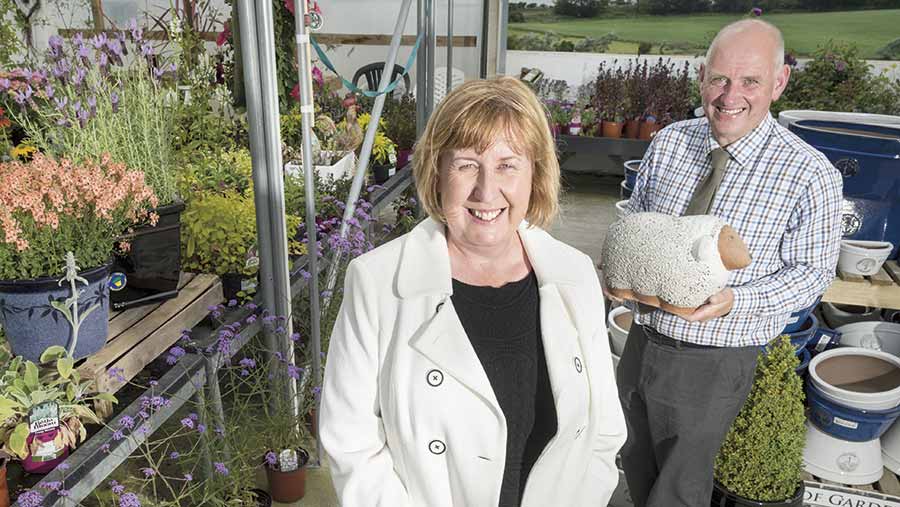
David and Helen Harrison. © Jim-Varney
Last year, 100,000 people visited the restaurant, farm shop and nursery at Harrisons of Greyabbey, which overlooks Strangford Lough. The diversification began in the 1990s when they started selling potatoes and vegetables to nearby shops, followed by an on-farm nursery.
They have recently added a 55-place function room to accommodate tourist coach parties.
Farm facts
- 130-cover restaurant with panoramic views on terrace
- 55-place function room
- Nursery and farm shop
- 50 staff – all living within seven miles
- 35ha arable farm
Tips
- Study the market you are in carefully to identify trends and openings.
- Be prepared for a different way of life and stay committed.
- Be a good listener and take on board what staff and customers say to meet their needs.
Biggest challenge
The steep learning curve which came when we stepped out of a relatively peaceful farming way of life into one where decisions come thick and fast.
Solution
Staying positive and employing the right staff to create a reliable and positive workforce that can cope with the many customers we have.
The Harper family, Top Barn Farm, Worcestershire
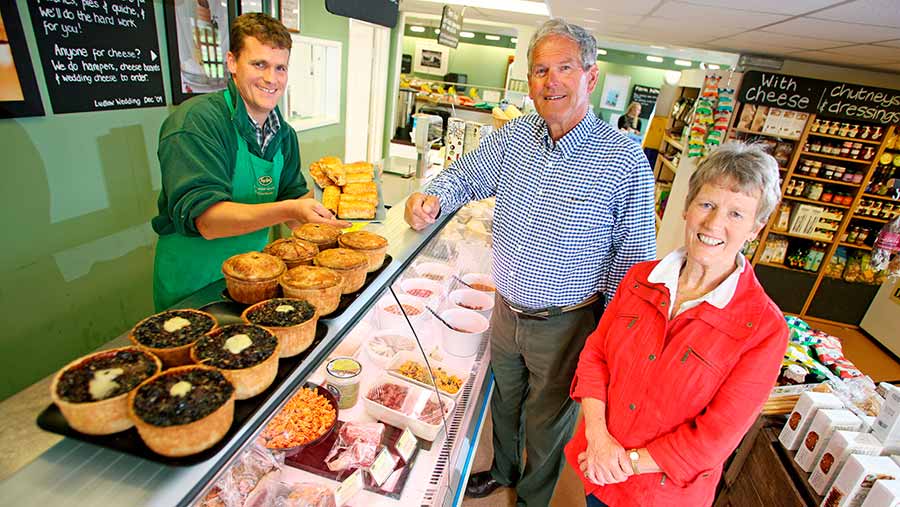
David and Diana Harper with their son Mike. © Richard Stanton
David and Diana Harper began diversifying in 1990 by converting old agricultural buildings into 60 business lets with a farm shop added in 2000.
John and the couple’s other two sons Richard and Mike took ownership in 2003 and have since added a vegetable packhouse which employs 90 people, a charcuterie, a plant centre, pick-your-own farm and leisure activity centre. The farm attracts 12,000 visitors a year.
Farm facts
- 320ha mixed farm
- Multi-let business park
- Farm shop and Christmas tree sales
- Fresh produce packhouse
- Fishing lakes
- Charcuterie
- Caravan site
Tips
- Make sure the business you go into is something you are passionate about. If you don’t love it, nobody else will.
- Bring in a third party to get another perspective and assess whether the new business will complement the existing set-up.
- Don’t overstretch yourself financially to the detriment of your farming business.
- Don’t view the diversification as addressing a weakness in your farming business, see it as an add-on.
Biggest challenge
Our biggest challenge was getting used to welcoming unknown people on to the farm. We once knew everyone coming up the farm drive.
Solution
We have learned to view the potential of the general public as our latest “crop”.
Richard and Fraser Manners, Manners Transport and Manners Combine Parts, Northumberland
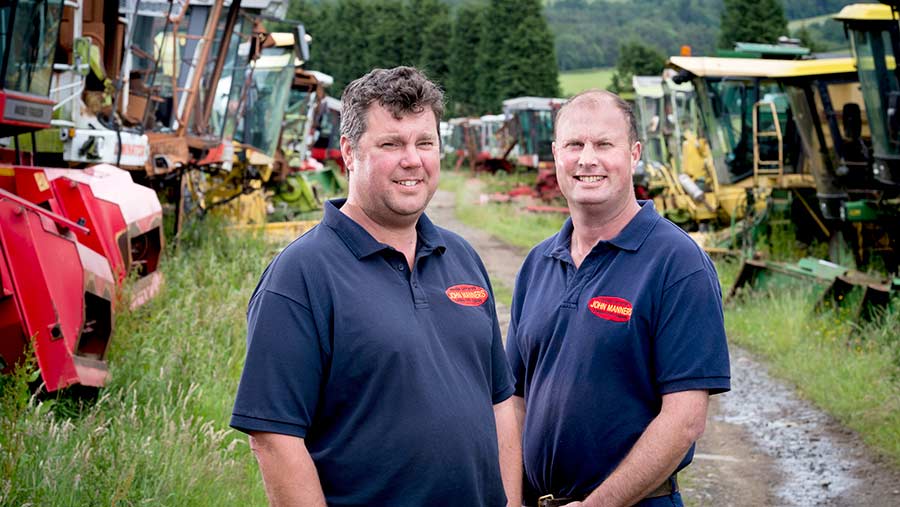
Richard and Fraser Manners. © Jim Varney
The Manners’ two farms boast a wide range of diversifications, including a combine breaking business which was started by their father in the 1970s.
The brothers also run a haulage contracting business, an HGV workshop and a shot-blasting and spray-painting facility. And they have converted dilapidated buildings into holiday cottages on the coastal farm.
Farm facts
- 16 full-time and five part-time employees
- 260ha arable, 60ha let out as grass parks
- Contract baling on 800ha
- Snow ploughing and gritting for Northumberland Council
Tips
- Never underestimate your own abilities. If something seems daunting, tackle it and you will be amazed at how you come out on top.
- Only choose a business that is appropriate for the location. There is no point starting up a holiday business if you live in an area which doesn’t attract tourists.
- Work hard for your customers. Customers appreciate good service and will keep coming back if you provide it.
Biggest challenge
Breaking into the market and getting recognised for what we do. To start with, the combine parts business was slow to take off because no-one knew who we were.
Solution
We overcame the problem with publicity in newspapers and by sheer hard work to build up our reputation for customer service.
David Horler, Tractorland, Somerset
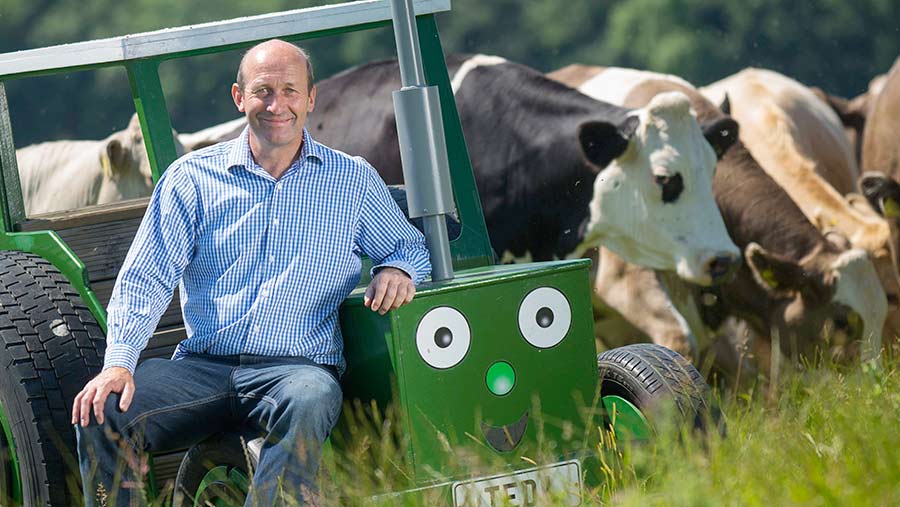
David Horler. © Jim Wileman
Somerset farmer David Horler and friend Ally Heard began making Tractor Ted films for children 18 years ago. They are about to launch new storylines and animations in July to add to a back catalogue of more than 17 DVDs and 11 books.
The smiling green tractor is also the face of play farms in Wiltshire and Perthshire that attract 250,000 visitors a year.
Farm facts
- Makes the Tractor Ted range of educational books, DVDs, gifts and clothing for ages two to six
- 200ha mixed organic farm
- 50-cow suckler herd
- Three business partners, three full-time and five-part time staff, plus sales agents
Tips
- Research the market thoroughly to establish the level of demand, no matter what the project is.
- Produce a rigorous business plan for the bank with carefully researched costs and expected returns.
- Create a team with a diverse range of talents and experience to cope with the new issues and pressures of an unfamiliar business. Then delegate the work to suit their skills.
Biggest challenge
Stock control. Ensuring we have enough product without sitting on too much stock.
Solution
We have fine-tuned stock levels through experience and invested in management software.
